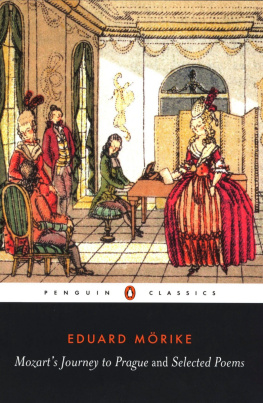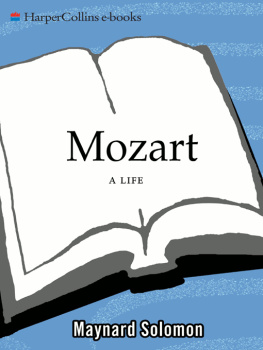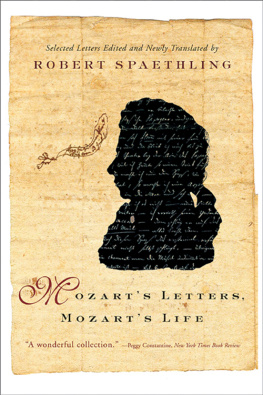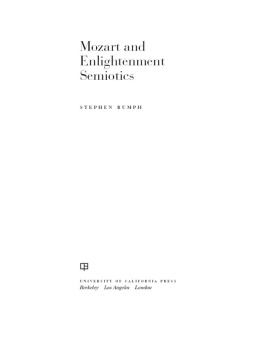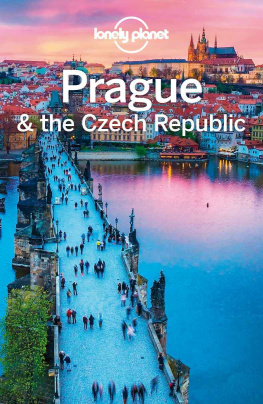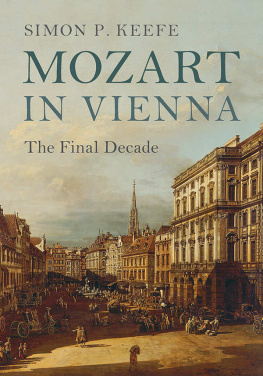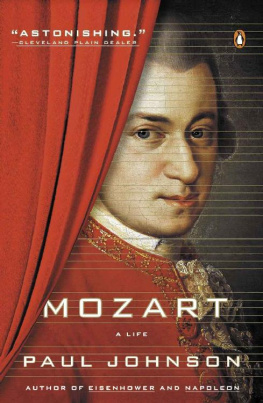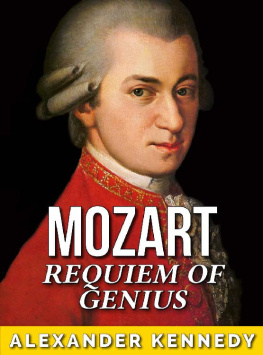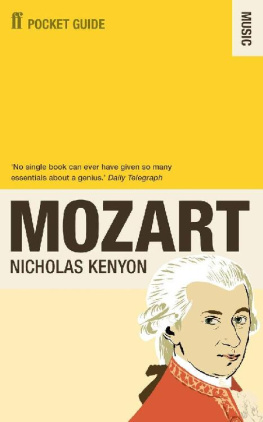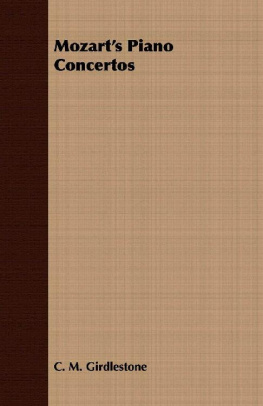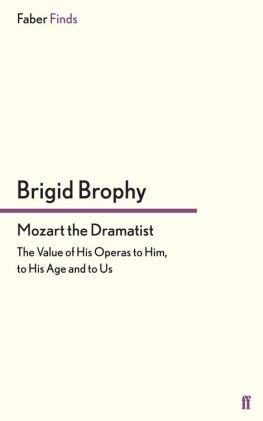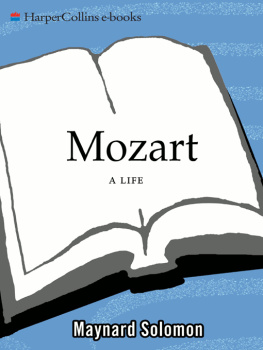
MOZARTS JOURNEY TO PRAGUE AND A SELECTION OF POEMS
EDUARD MRIKE (180475) was the seventh child of a large family in Ludwigsburg (Wrttemberg). His father was a doctor who died when Mrike was thirteen. He studied theology in Tbingen and became a Protestant pastor in 1834, a profession in which he was seldom happy and from which he retired after nine years. His novel Maler Noten was published in 1832 and a first volume of poetry in 1838. Between 1851 and 1866 he taught literature at a seminary in Stuttgart, and continued to write, including his masterpiece Mozarts Journey to Prague (1855). Mrike never travelled beyond his native Wrttemberg and led a quiet and increasingly reclusive life with his Catholic wife and two daughters. He spent the last decade of his life in virtual solitude, anxious to avoid the fame his writing had brought him.
DAVID LUKE is an Emeritus Fellow of Christ Church, Oxford. Among the German authors he has written about and translated are Goethe, Kleist, the brothers Grimm and Thomas Mann. His translation of Goethes Faust won the European Poetry Translation Prize. His previous work for Penguin includes Goethes Selected Verse and Selected Tales of the brothers Grimm.
EDUARD MRIKE
Mozarts Journey to Prague and a Selection of Poems
Translated and with an Introduction and Notes by
DAVID LUKE
Scots translations by GILBERT MCKAY
PENGUIN BOOKS
PENGUIN BOOKS
Published by the Penguin Group
Penguin Books Ltd, 80 Strand, London WC2R 0RL, England
Penguin Putnam Inc., 375 Hudson Street, New York, New York 10014, USA
Penguin Books Australia Ltd, 250 Camberwell Road, Camberwell, Victoria 3124, Australia
Penguin Books Canada Ltd, 10 Alcorn Avenue, Toronto, Ontario, Canada M4V 3B2
Penguin Books India (P) Ltd, 11, Community Centre, Panchsheel Park, New Delhi 110 017, India
Penguin Books (NZ) Ltd, Cnr Rosedale and Airborne Roads, Albany, Auckland, New Zealand
Penguin Books (South Africa) (Pty) Ltd, 24 Sturdee Avenue, Rosebank 2196, South Africa
Penguin Books Ltd, Registered Offices: 80 Strand, London WC2R 0RL, England
www.penguin.com
First published by Libris 1997
Revised edition published by Penguin Books 2003
1
Translation, Introduction and Notes copyright David Luke and Gilbert McKay, 1997, 2003
All rights reserved
The moral rights of the translators has been asserted
Except in the United States of America, this book is sold subject
to the condition that it shall not, by way of trade or otherwise, be lent,
re-sold, hired out, or otherwise circulated without the publishers
prior consent in any form of binding or cover other than that in
which it is published and without a similar condition including this
condition being imposed on the subsequent purchaser
EISBN : 9780141907734
Contents
Mozarts Journey to Prague
(1855) |
Introduction
As the half-forgotten author of poems which are among the most remarkable in the German language but became famous chiefly as the texts of songs, and of a minor masterpiece of imaginative musical biography, an inspired narrative prose poem about Mozart which lives chiefly in the borrowed glory of the greater masterpiece it celebrates, Eduard Mrike suffers the paradox of owing his exalted but inconspicuous place in German literary history largely to the genius of others. How many readers, even in Germany, listening to the most exquisite of Hugo Wolfs Mrike settings, remember who wrote the words, and how many will understand the modest and mysterious title of Mozart auf der Reise nach Prag (literally Mozart en route to Prague) if they do not already know the story as a Mozartian fantasy, a brilliant literary footnote to Don Giovanni? And yet it seriously distorts Mrikes achievement to overlook either the story itself or the poetry to which it is closely related. Both are Mrikes essential legacy: Mozarts Journey to Prague, a work created at the height of his maturity but charmed into existence by memories that went back thirty years to the beginning of his adult life, and the lyrical development to which it essentially belongs.
Mrike lived all his life hidden away in south-west Germany, in the cultural region of Swabia, corresponding approximately to the political territory of Wrttemberg, in which he was born in 1804 and whose borders he almost never crossed. 1804, as it happened, was the year in which Napoleon became Emperor of the French and began rearranging Germany. The old medieval Holy Roman Empire of the German Nation still nominally existed during the first two years of Mrikes life, and Wrttemberg, also the native land of Schiller and Hlderlin, was a medium-sized state within it, half Catholic and half Protestant. Napoleon, to reward the reigning Duke who had earned his favour, made the duchy a kingdom in 1805, before abolishing the Empire in 1806; and Wrttemberg was still a medium-sized kingdom when another German Empire, this time courtesy of Bismarck, came into being four years before Mrikes death in 1875. The poet had been virtually untouched by these events or by any of the intervening political perturbations of the nineteenth century. He remained an introverted and neglected provincial dreamer, though in his later life he did gain some recognition in Germany, even outside the Swabian heartlands. Even in Germany, after his death, he was again forgotten for about another thirty years, but from the turn of the century until now German literary scholars have taken an increasing interest in him, and a historical-critical complete edition of his works and letters, begun in 1967, is still being slowly put together. In England and elsewhere outside his linguistic sphere he remains almost entirely unknown.
Mrikes native Ludwigsburg had been built near Stuttgart at the beginning of the eighteenth century, in the formal Italianate style, as a garrison town and the summer residence of the Wrttemberg court. His mother was a Protestant clergymans daughter and his father at first considered adopting the same career, but became a doctor instead and died from a stroke in 1817. There were thirteen children, of whom seven survived infancy; Eduards brothers Karl and August and his sisters Luise and Klara were especially close to him. His education seems to have been based from the outset on the assumption that he would become a pastor like his grandfather, though personal suitability or conviction commonly played a lesser part in such decisions than the fact that the Church offered long years of elaborate vocational training at public expense, leading eventually to modest but secure life-long employment. When Eduard was thirteen, the traumatic loss of his father threatened to interrupt this programme; fortunately, his rich and cultivated uncle Friedrich Eberhard von Georgii, a high legal official, offered him hospitality for a year to enable him to complete the first stage of his schooling. Living in his uncles large rococo mansion in Stuttgart, the boy encountered the ancien rgime elegance he was later to celebrate in Mozarts Journey to Prague, as well as being encouraged to further study of the Latin and Greek classics to which his poetry is substantially indebted.
Mrike failed his all-important Landexamen at the age of fourteen, but his uncles influence nevertheless secured his admission to the Lower Theological Seminary in Urach, an enchanting small fortified town surrounded by wooded hills, one of the medieval Swabian duchies. His commitment to theological studies was less than total, but he was later to remember his years in Urach with great nostalgia. It was here, and later at the Theological Seminary in Tbingen, that he formed close youthful friendships, some of them lifelong, as with Wilhelm Hartlaub, who, like Mrike himself, ended up as a simple village pastor, and Johannes Mhrlen, who became a Professor of Economics at the Stuttgart Polytechnic. With Ludwig Bauer, a fellow poet whom he met at Tbingen and who was to remain one of his chief intimates, Mrike found, Tolkien-like, that he could construct elaborate private mythologies: the imaginary remote island kingdom of Orplid, with its tutelary goddess Weyla, its lineage of kings and disappearing civilization, was their joint invention, and was to play a significant part in Mrikes rambling, never-finished novel
Next page
